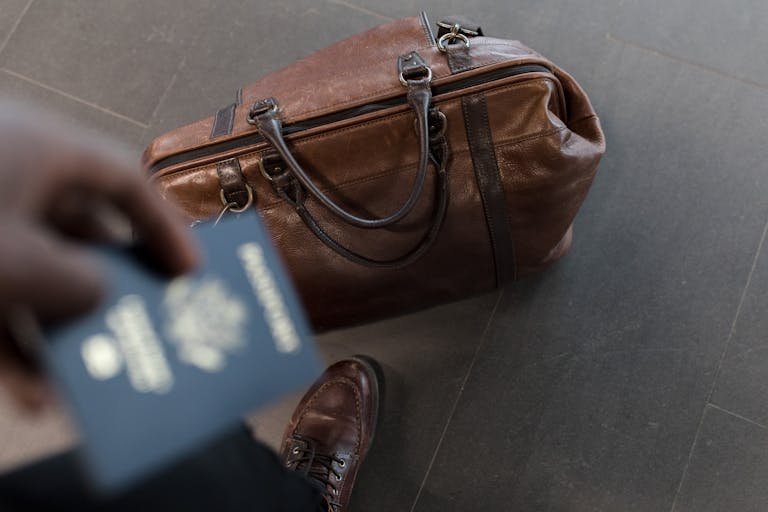Passport Denied: 25 Countries You Cannot Visit with a Criminal Record (2024 Non-Travel Guide)
Introduction
So, you’ve got a criminal conviction and the travel bug? Well, slow down, because your past might just clip your wings!
Whether you’re a reformed shoplifter or a one-time tax evader, your criminal history could turn your dream vacation into a nightmare at customs.
But don’t cancel your passport application just yet! Let’s dive into the world of international travel restrictions and discover which countries might give you the cold shoulder due to your felony conviction.
The No-Fly List: Countries That Deny Entry
Ready for a whirlwind tour of countries that might stamp “REJECTED” on your visa application? Here’s your exclusive (but not in a good way) list of refused entry due to criminal convictions:
- 🇨🇦 Canada: Our friendly northern neighbor isn’t so friendly to those with DUIs or drug offenses. Under Canada’s immigration law, individuals with certain felony convictions may be deemed inadmissible. Foreign nationals with serious criminal records may face restrictions on entry.
- 🇦🇺 Australia: The land down under will bring your travel plans down under by Australian authorities if you’ve got a substantial criminal record.
- 🇳🇿 New Zealand: Kiwis are sweet, but not to those with convictions carrying potential 12+ month sentences.
- 🇯🇵 Japan: A criminal record might mean Sayonara to your Tokyo dreams.
- 🇨🇳 China: The Great Wall isn’t the only barrier you might face with a record.
- 🇺🇸 United States: Yes, even if you’re a citizen, re-entry can be tricky with certain convictions.
- 🇬🇧 United Kingdom: The UK might not roll out the red carpet if you’ve got a serious offense.
- 🇪🇺 European Union (Schengen Area): One “no” could mean no to 26 countries!
- 🇦🇪 United Arab Emirates: Dubai’s luxury might remain a mirage with a criminal past.
- 🇸🇬 Singapore: Strict laws extend to strict entry requirements.
- 🇰🇷 South Korea: K-pop might be universal, but entry with a record isn’t.
- 🇲🇾 Malaysia: Your criminal record could mean no Malaysian getaway for you.
- 🇹🇭 Thailand: The Land of Smiles might not be smiling at your rap sheet.
- 🇧🇷 Brazil: Carnival’s off the table if you’ve got certain convictions.
- 🇦🇷 Argentina: Tango requires two, but Argentina might leave you dancing alone.
- 🇲🇽 Mexico: Even all-inclusive resorts have their limits.
- 🇿🇦 South Africa: A safari might be out of reach with a shadowy past.
- 🇮🇳 India: The Taj Mahal could remain a distant dream.
- 🇷🇺 Russia: From Russia with love? Not if you’ve got a record.
- 🇨🇱 Chile: Wine country might leave a sour taste if you can’t get in.
- 🇵🇭 Philippines: Island hopping could be a no-go.
- 🇮🇱 Israel: The Holy Land might not be so welcoming.
- 🇻🇳 Vietnam: Good morning, Vietnam. Not with certain convictions.
- 🇨🇷 Costa Rica: Pura Vida, unless you’ve got a criminal record.
- 🇳🇴 Norway: The fjords might remain a distant dream.
The “Maybe” List: Countries That Might Let You In (With a Big IF)
Some countries are a bit more forgiving of criminal records and individuals convicted, but you’ll need to jump through some hoops as there are entry criteria:
- 🇲🇽 Mexico: Minor offenses might be overlooked, but you’ll need to apply for a special permit to visit Mexico.
- 🇬🇧 United Kingdom: Rehabilitation periods might work in your favor. A prison sentence of less than 30 months can impact your eligibility, as spent convictions may allow entry if certain criteria are met.
- 🇦🇺 Australia: Certain visas allow for character assessments.
- 🇨🇦 Canada: Temporary resident permits or criminal rehabilitation might be your ticket to gain entry despite a criminal record.
- 🇳🇿 New Zealand: Character waivers are available in some cases.
Remember: Always check with the embassy to see if you are allowed entry with criminal records before booking those tickets!
Frequently Asked Questions
- Q: Does a misdemeanor count as a criminal record for international travel? A: It can, depending on the country and the criminal offense. Some countries only care about felonies, while others consider any conviction.
- Q: How long do criminal records affect international travel? A: It varies by country. Certain countries look at lifetime records, while others have time limits (e.g., 10 years for Canada).
- Q: Can I get a special visa if I have a criminal record? A: Some countries offer waivers or special permits, but they’re usually granted on a case-by-case basis.
- Q: Will traffic violations affect my ability to travel? A: Minor traffic violations usually don’t, but DUIs can be a major red flag for many countries.
- Q: Do I have to disclose my criminal record when applying for a visa? A: Yes, always be honest. Lying on a visa application form can result in a permanent ban.
- Q: Can I transit through a country that bars entry with a criminal record? A: It depends on the country and whether you need to pass through immigration. Always check beforehand.
The Silver Lining: Your Travel Options with a Temporary Resident Permit
Don’t despair! Here’s a handy chart of popular destinations and their stance on travelers with criminal records:
| Country | Minor Offenses | Major Offenses | Special Conditions |
| Canada | Maybe | No | Rehabilitation Possible |
| Mexico | Yes | Maybe | Special Permit Required |
| UK | Maybe | No | Depends on rehabilitation period |
| Japan | Maybe | No | Case-By-Case Basis |
| Australia | Maybe | No | Character assessment for some visas |
What Happens If You Ignore the Rules? The “I Told You So” Edition
🚨 So You Decided to Be a Rebel: Consequences of Traveling Despite Restrictions 🚨
Okay, hotshot. You didn’t listen to reason or your good senses and still decided to visit a country that doesn’t welcome your criminal history. Nice work, Sherlock. (That’s sarcasm, in case you missed it.) Let’s break down what you can expect from your “brilliant” decision:
- Denied Entry: Best case scenario? You’ll be turned away at the border by border officials. That means wasted airfare, hotel bookings, and vacation days. Hope you like airport food!
- Deportation: If you somehow slip through initial screening, you might face deportation when your criminal convictions are discovered. Nothing says “vacation memories” like a free ride in a government vehicle back to the airport.
- Fines: Many countries will slap you with hefty fines for attempting to enter illegally. It’s like paying for an extra vacation, except you don’t get to enjoy it.
- Detention: Some countries might deny entry and detain you while they process your case. It’s like an all-inclusive resort, minus the resort part.
- Travel Ban: Congratulations! You might win a long-term or permanent ban from the country. So much for future trips.
- Criminal Charges: In some cases, you could face criminal charges for making false statements on visa applications or entry forms. Legal trouble abroad? That’s a souvenir no one wants.
- Impact on Future Travel: This stunt could affect your ability to travel to other countries too. It’s the gift that keeps on giving!
- Stress and Embarrassment: Don’t underestimate the psychological toll of being treated like an international criminal. It’s not exactly Instagram-worthy.
- Financial Loss: Between wasted bookings, fines, and potential legal fees, your wallet is in for a world of hurt.
- Diplomatic Incidents: In rare cases, you might cause a minor diplomatic kerfuffle. Congratulations, you’re now an international incident!
The bottom line? It’s not worth it. Stick to the rules. There are plenty of places in the world that will welcome you with open arms, criminal convictions, and all.
Don’t risk your time, money, and freedom for a vacation that’s likely to end before it begins. Remember: The only bars you want to see on your vacation are the ones that serve drinks.

Cautionary Tales: When Travel Plans Go Awry
Let’s take a look at some real-life examples of travelers who learned the hard way about international travel restrictions:
- The Surprised Sportsman: In 2018, a former NFL player was denied entry to Canada for a charity event due to a 10-year-old DUI conviction. He was unaware that Canada considers DUIs as serious criminal offenses, resulting in embarrassment and a canceled appearance.
- The Honeymoon Heartbreak: A newlywed couple from the UK had their dream honeymoon to the US cut short in 2019 when the bride was denied entry due to a past drug offense. Despite being upfront about her record, she was detained for 24 hours before being sent back to the UK, while her husband continued the trip alone.
- The Business Trip Blunder: In 2020, an Australian executive was deported from Japan after customs officials discovered a 15-year-old assault conviction during a routine check. This resulted in a missed conference and strained business relationships.
- The Volunteer’s Visa Vexation: A Canadian charity worker was barred from entering India in 2021 for a volunteering project due to a minor theft conviction from her youth. She had already paid for flights, accommodations, and project fees, all of which were non-refundable.
- The Family Reunion Fiasco: In 2022, a US citizen was prevented from entering the UK to attend his sister’s wedding because of a 5-year-old conviction for marijuana possession. He had assumed his misdemeanor wouldn’t affect international travel, leading to a missed family milestone.
These stories underscore the importance of thoroughly researching entry requirements before planning international travel, especially if you have a criminal record.
Smart Traveler’s Toolkit: How to Check Your Eligibility with a Criminal Record
Before you start dreaming about exotic destinations or booking those non-refundable tickets, here are some crucial steps to check your travel eligibility:
- Know Your Criminal Records: Obtain a copy of criminal records from your local law enforcement agency or the FBI. This will give you a clear picture of what potential host countries will see.
- Research Country-Specific Rules: Visit the official embassy or consulate websites of the countries you wish to visit. Look for sections on visa application, entry requirements, and entry restrictions.
- Use IATA’s Timatic Database: Many airlines use this database to determine passenger eligibility. While it’s primarily for airline use, some travel agents can access it for you.
- Consult a Travel Lawyer: If your situation is complex, consider speaking with a lawyer who specializes in international travel law. They can provide personalized advice based on your specific record and destination.
- Contact the Embassy Directly: If you’re unsure about your eligibility, reach out to the embassy of your intended destination. Be prepared to provide details about your conviction(s).
- Check Rehabilitation Programs: Some countries, like Canada, offer rehabilitation programs for travelers with criminal records. Research if you’re eligible for these.
- Look Into Temporary Resident Permits: For countries that offer them, these can be a way to visit despite having a record. Start this process well in advance of your intended travel date.
- Be Honest on Visa Applications: Always disclose your criminal history when asked. Lying can result in much more severe consequences than a denied visa.
- Consider Visa-Free Countries: If you’re from a country with visa-free agreements, research whether your criminal record affects these arrangements.
- Plan for Extra Time: If you need to apply for special permits or waivers, start the process much earlier than you would for a typical trip. These applications can take months to process.
Remember, a little preparation can go a long way in preventing travel disasters. It’s always better to know your status before you find yourself in an uncomfortable situation at a foreign border!
Conclusion: The World Is Still Your Oyster (Kind Of)
Having a criminal record doesn’t necessarily mean your passport has to gather dust. While some doors may close, others remain open – you just need to know where to look and how to navigate the system.
Always do your homework before planning a trip, be honest in your applications, and consider seeking legal advice for complex cases.
Remember, travel broadens the mind, and sometimes, a complicated journey makes for the best stories. So don’t let your criminal history past define your future adventures.
Who knows? Your next great trip might be to a country you never even considered before. Happy (and legal) travels!
P.S. If all else fails, there’s always virtual reality travel. No passport is required, and the only criminal records they care about is your high score!





